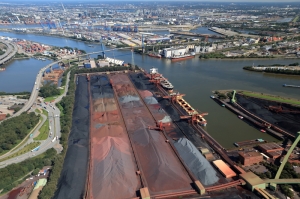


(Posted on 21/01/20)
According to preliminary calculations by the German Coal Importers Association (Verein der Kohlenimporteure e. V.), which represents the interests of the imported hard coal market in Germany., world trade in hard coal increased by 0.7 % to 1,218 million tonnes in 2019, and global hard coal production increased by 2.0 % to 7.2 billion tonnes. China's production alone rose by 171 million tonnes or 5 % to 3.7 billion tonnes, while Indonesia, a major supplier to China, increased its production by 52 million tonnes or 11 %. The seaborne exports of Indonesia, Australia, Russia and Canada increased, while those of the USA significantly declined.
In 2019, German hard coal imports dropped substantially by around 15% or 7 million tonnes. Imports of coking coal receded by 7 % and imports of steam coal by 17 %. Electricity generation from hard coal even decreased by 31 %. Within only 3 years it has roughly halved to about 57 terawatt hours (TWh). The reasons for this are the growth of power generation from renewables, the intensified competition with currently cost-effective natural gas, and the distinctly risen CO2 price in the European emissions certificate trade.
Hard coal-fired power plants can stabilize the electricity grid. This was illustrated by the Deloitte study "Assessing the Flexibility of Hard Coal-fired Power Plants for the Integration of Renewable Energy in Germany" (Deloitte Finance, November 2019), commissioned by the VDKi. From a purely technical perspective, the existing coal-fired power plant park in Germany (2018) could absorb a growing share of fluctuating renewable energies of 50%, 60% or 70%, and integrate them safely into the system. The study shows in particular:
- During a "cold dark doldrum episode", coal-fired power plants generate twice as much electricity as on an average day when the share of renewables is 50%, and three and a half times more electricity when the share of renewables is 70%.
- Germany becomes a net importer during a "cold dark doldrum episode."
Regarding the imminent adoption of the Coal Exit Act, it becomes increasingly evident that decommissioning tenders would lead to an unacceptable unequal treatment of hard coal-fired power plants between themselves. This unequal treatment would foreseeably lead to lengthy legal disputes and would therefore be neither legally secure nor sustainable. For this reason, a consensual solution between all power plant operators should instead also be sought in the hard coal sector. The flexibility of hard coal-fired power plants must be considered in the legislation. As a result, new and lower-emission plants must not be discriminated against any more than hard coal-fired power plants in the South, which will not be permitted in tenders at the beginning, according to the latest draft legislation. Moreover, equal treatment should be provided for safety readiness, as well as fair access for hard coal-fired power plants to safety readiness previously reserved for lignite-fired power plants.
VDKi German and European members come from the fields of power industry, industry, trade and logistics. The association currently has 59 members, whose plants consume about 80 % of the German hard coal requirement of around 47 million tonnes. Imported coal covers 100 % of Germany's coal requirements. The VDKi thus represents the majority of the hard coal market in Germany with a financial volume in the billions. The VDKi regularly examines the significance of the global hard coal markets for the European and German import hard coal markets, points out prospects for the further development of imports and regularly publishes statistics on German hard coal imports and prices.
ADM and Bayer have announced a three-year extension of their partnership to support farmers in Maharashtra... Read more
The National Grain and Feed Association (NGFA) has applauded Senator Deb. Fischer’s (R-Neb.) reintroduction... Read more
Anglo American plc and Teck Resources Limited have received regulatory approval from the Government... Read more
The Rhodes Ridge Joint Venture has approved a $191 million (A$294 million) (Rio Tinto share $96 million... Read more
Trafigura Group Pte Ltd, a global leader in the commodities industry, has announced its financial results... Read more
Rio Tinto has successfully produced the first copper from the Johnson Camp mine in Arizona using its... Read more
The American Soybean Association’s World Initiative for Soy in Human Health programme and the... Read more
Karlka Nyiyaparli Aboriginal Corporation (KNAC) Registered Native Title Body Corporate and Rio Tinto... Read more
OCI Global, a leading global producer and distributor of nitrogen products has announced that it has... Read more
In December 2024, SSAB was granted a permit by the Land and Environment Court at Umeå District... Read more